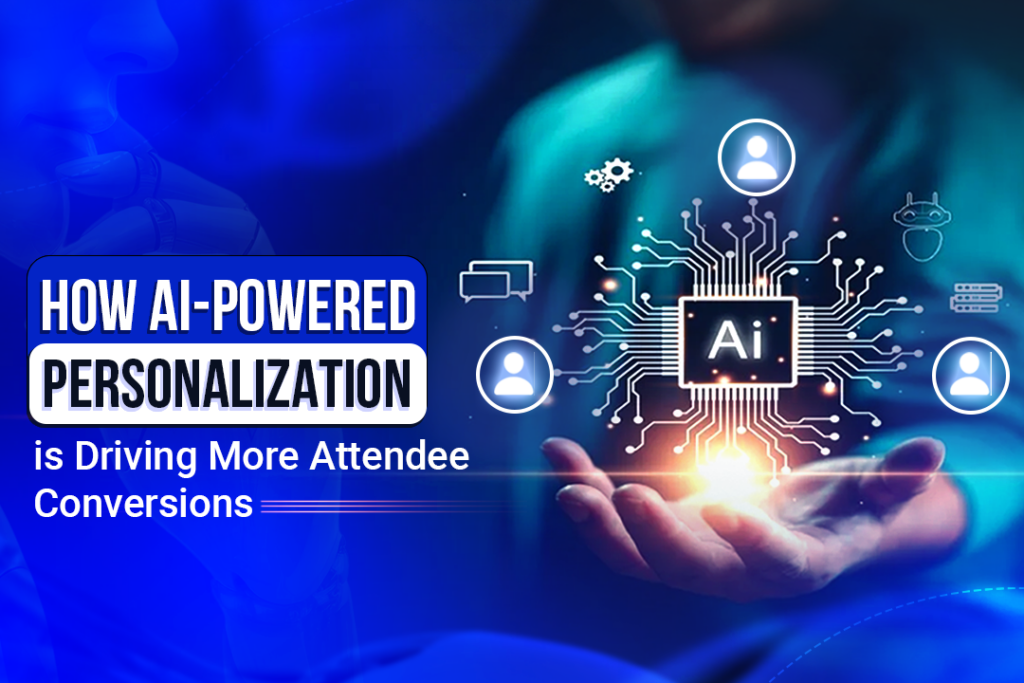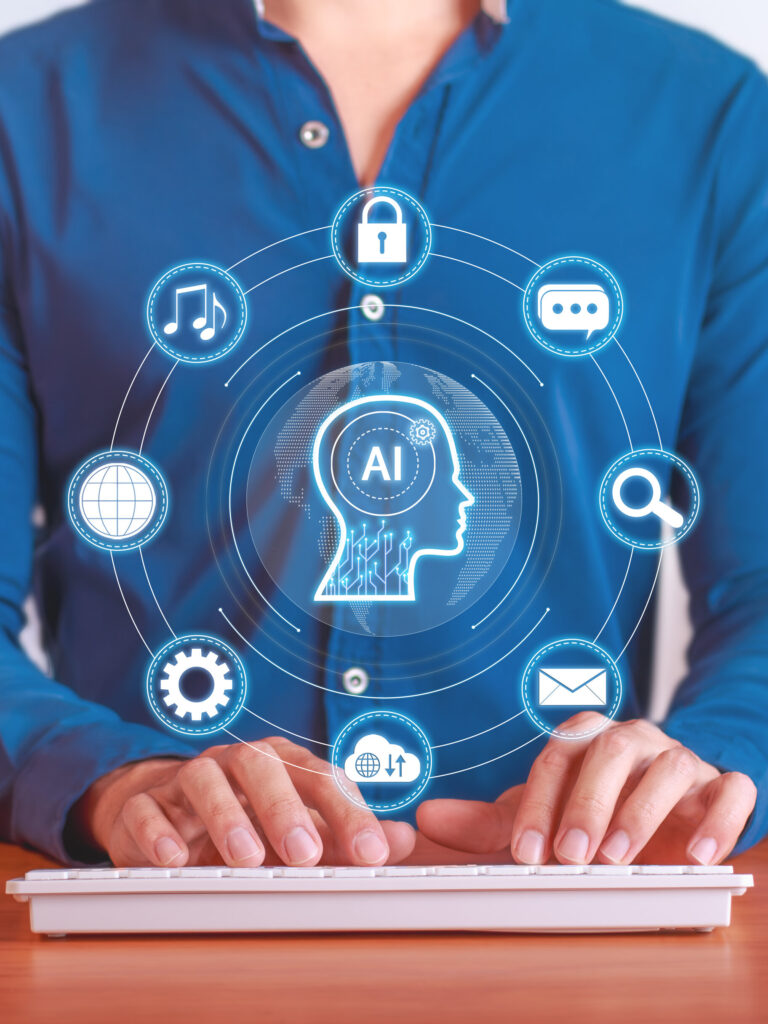
AI-powered personalization in events has been discussed in global event circuits for the past two years. However, in recent times, event marketers have moved away from traditional marketing, which focuses on a cookie-cutter approach of one-size-fits-all to event attendees. AI-powered personalization is now the norm as most event organizers aim to provide tailor-made agendas and strategies to achieve attendee engagement and conversions.
In the Adobe Summit 2025, the main discussion across all sessions was about the industry’s shift towards tailoring experiences to individual customer needs and preferences. AI tools are enabling marketers to achieve mass personalization at scale to increase overall attendee conversions.
Providing customized interactions and content to attendees makes them feel unique and valued, as opposed to generic marketing information, which may not resonate that well with them. AI enables hyper-personalization, thereby leading to increased engagement, enhanced customer experience, and long-term customer (attendee) retention.
AI-powered personalization in events is revolutionizing how event organizers engage audiences, increase registrations, and drive higher attendee conversions. This article explores how AI reshapes event personalization, boosts engagement, and maximizes event ROI.
What Does “AI-Powered Personalization” Really Mean for Events?
AI-powered personalization leverages machine learning and predictive analytics to give attendees a uniquely engaging experience. Before we delve into AI-powered personalization and what it truly means in the context of events, it is important to understand the meaning of attendee conversions. We’ve tried to elucidate this in the table below:
Conversion Stage | Conversion Process |
Registrations | Website visitor → Attendee |
Session Attendance | Registered attendee → Active participant |
Engagement | Passive attendee → Meetings, interactions, content |
Lead Generation | Visitor → Qualified lead for sponsor/exhibitor |
Post-Event Action | Attendee → Subscriber, buyer, or return attendee |
Now that we have understood the attendee conversions, we can move on to discuss AI-powered personalization in the context of events.
To begin with, AI personalization in events simply means catering to the individual and unique needs of the attendees rather than taking a one-size-fits-all approach. From the pre-event targeting to the on-site engagement to the post-event follow-ups, AI personalization tools provide customized interactions for optimum conversion rates.
In the Pre-event Phase…
AI-personalization starts well before the event. AI tools capture data and predict who is a potential high-intent lead (attendees). Event marketers use this information to achieve conversion, which in this case refers to getting a possible lead to register for the event.

In our blog, “The Secrets to Building a Thriving Event Community,” we have discussed forums and platforms where AI tools can be used to track and identify high-intent leads. You can refer to that to understand how building communities can be effective breeding grounds for potential attendees. Common interest groups and communities offer discussion platforms where people come together to express themselves, connect, and upgrade and upskill their knowledge bank.
AI-based lead scoring models look at factors like job role, engagement history, and similarity to past converters to predict attendance likelihood. This means your pre-event campaigns can be laser-focused, sending exclusive early-access invites or tailored content to those who score highest. The result is higher conversion from invite to registration, and a boost in overall event turnout. Research shows that leveraging lead scoring and personalization can drive up conversion rates substantially by making the invitation process feel directly relevant to the attendee.
Event marketers are integrating AI tools with their CRM to automate audience segmentation and content creation. For example, AI can auto-generate email campaigns customized to each segment’s behavior and interests, ensuring every prospect gets the right message at the right time. Personalized engagement can be provided to potential attendees around the clock during the event promotion phase using chatbots on event sites or registration pages. These chatbots can answer frequently asked questions and guide visitors toward relevant event benefits, helping them decide whether to attend the event or not.
All of the above builds a strong connection between the attendee and the idea of them being at the event, thereby increasing chances of higher conversions during the pre-event phase.
During the Event..
Some commonly used AI features during the event are the AI Chatbot, AI Matchmaking, and AI for predictive meeting scheduling. The AI Chatbot acts like an on-site concierge to attendees, guiding them and giving them suggestions on how to make the most of the event. For example, an attendee might ask a chatbot about a specific product demo; a smart chatbot can not only provide the schedule but also check real-time crowd data, suggest a less busy viewing time, and even book a meeting with a product expert.

AI matchmaking gathers data about the attendees and then uses that information to connect them with suitable matches who would make a good networking match for them. All of this is done in real-time using smart algorithms that use data to effectively predict and suggest suitable matches.
For example, a startup owner would most likely be interested in industry experts in his field or potential investors for his firm. The AI Matchmaking feature on the event app would recommend such people to the startup owner after careful consideration of their expectations from the event.
Another interesting use of AI-powered personalization in events is its ability to suggest content to the attendees at the event. Every event has countless speaker sessions, fireside chats, panel discussions, and workshops. It gets challenging for them to decide on what to attend and what to skip. AI-powered tools can give ready-to-use content (session) suggestions for attendees to use. These suggestions are similar to the ones you get on Netflix when, after a certain point in time, the app suggests shows and movies to you based on your viewing patterns.
In the Post-Event Phase..
The period after the B2B event is crucial for event marketers as they have to capture maximum data from them while the memories of the event are fresh in their minds. AI helps by powering timely, personalized follow-ups at scale. AI-powered automation platforms can send personalized thank-you emails to each attendee referencing specific sessions or exhibitors they interacted with.

AI can also analyze attendee’ on-site behavior to trigger follow-up content tailored to their interests, like sending a whitepaper download mentioned in a session they attended or a discount offer on a product they viewed. This shows attendees that their participation was valued and encourages continued engagement.
With the data collected post-event, AI tools can now analyse it and do lead nurturing to achieve conversions for the next event. And how do they engage attendees post-event? By getting them to be part of communities and sending specifically targeted content that would be useful to them. As discussed earlier, AI-driven lead scoring remains in play here.
As new data comes in from the event (such as booth scans, session participation, or webinar sign-ups), machine learning models can update lead scores in real time. This lets sales teams prioritize follow-ups and aim to convert potential leads for the event in the next year.
Now that we have understood how AI personalization helps at every phase of the event, from the planning stage to the post-event feedback stage, let’s take a look at some tools that are used in the process.
Key Tools to Achieve AI-Personalization In Events
With every passing quarter, existing AI tools are getting upgraded, and new ones are replacing old ones. However, we’ve curated a few to help you start your quest to achieve AI-powered personalization for your events.
Recommendation Engines for Content
These AI systems are built to enhance event apps and websites, wherein they analyze attendee data and recommend speaker sessions, workshops, and activities they can participate in during the event. Some notable examples of such tools are EventX’s AI that can recommend relevant sessions, speakers, or networking opportunities to individuals based on their profile and past behavior. Similarly, enterprise solutions like IBM’s Watson Discovery or Amazon Personalize can be configured to deliver content recommendations in real-time at events.
AI Matchmaking & Networking Platforms
Some of the commonly used AI Matchmaking and Networking Platforms are Grip, Brella, Jublia, Swapcard, and B2B Match. These tools use algorithms to recommend potential connections to event attendees. Grip is a popular AI matchmaking platform that was used at TechCrunch Disrupt 2024.
Virtual Assistants and Chatbots
AI assistants and chatbots have taken over the world, and every industry is taking advantage of this tech advancement. In the realm of events, AI assistants and chatbots help both event planners and attendees. Some examples of virtual assistants and chatbots are IBM Watson Assistant, Dialogflow (Google), or Drift bots, which can be deployed on event websites, mobile apps, or messaging channels. They handle inquiries, provide information, and even help with tasks like registration or booking meetings.
AI-Powered CRMs and Lead Scoring Tools
Many CRM and marketing automation platforms now have AI capabilities to assist with events. In tools like Salesforce Einstein, HubSpot, or Demandbase, predictive lead scoring can rank event leads by conversion likelihood, so sales teams know where to focus first. Studies show that companies using lead scoring and nurturing effectively generate 50% more sales-ready leads at 33% lower cost than those that don’t.
These were a few AI tools that enable personalization in events. By adopting the right AI tools, even lean event teams can deliver a highly personalized experience at scale, ensuring each attendee feels valued and converting more of them into engaged prospects and customers.
The ROI of AI-Powered Personalization for Events
So far, we have understood how AI-powered personalization leads to more conversions. Now, let’s dive deeper into that aspect to understand how it impacts ROI.
i) Firstly, AI-powered tools enable higher registration rates. By analyzing user behavior, demographics, and past engagement data, AI allows event marketers to send hyper-targeted messaging. Personalized email campaigns, social media ads, and website content ensure potential attendees receive content aligned with their interests and decision-making triggers.
An example of this is that instead of a generic ad, a tech executive sees messaging tailored to AI panels and C-suite networking lounges. This would lead to a higher click-through rate and ultimately more registrations. In terms of ROI, this enables reduced marketing cost while achieving reduced marketing spend per acquisition, and increased results on promotional campaigns.
ii) As discussed above, AI matchmaking leads to improved networking and better professional connections, which would lead to higher follow-up rates and long-term business relationships. This results in increased perceived event value and stronger community retention.
iii) AI-powered tools also enable better booth traffic through personalized exhibitor suggestions. Exhibitors invest heavily in event presence and want quality leads. AI helps match attendees to relevant exhibitors based on interests and buying signals. For example, when an IT director receives a prompt to visit booths showcasing cybersecurity solutions based on their agenda and role, he is more likely to be interested in their demos and invest in the business. This leads to greater satisfaction among sponsors and exhibitors, leading to repeat business and upsell opportunities.
All in all, from ticket sales to attendee engagement to sponsor retention, AI personalization helps improve performance in every aspect of the event.
Key Takeaway
AI-powered personalization is not a fad; it’s a necessity for competitive event marketing. As per a research report published on Market.US, AI-powered personalization event strategies are proving their value by boosting attendee satisfaction by 20%. And with the rise in investments in the AI sector, the use of AI tools will see a steady increase, leading to enhanced attendee experiences.
Events that embrace AI-driven personalization are likely to see higher engagement, better attendee satisfaction, and increased ROI. As event marketers, it is important to understand attendee behavior, leverage AI strategically, and optimize all kinds of AI personalization efforts to stay ahead in the market and organize path-breaking events that lead to high levels of attendee engagement and satisfaction.
So, how does AI-powered personalization drive more attendee conversions? When attendees feel seen and understood through personalized content, recommendations, and communication, they are more likely to convert and become long-term loyal customers.


Comments are closed.